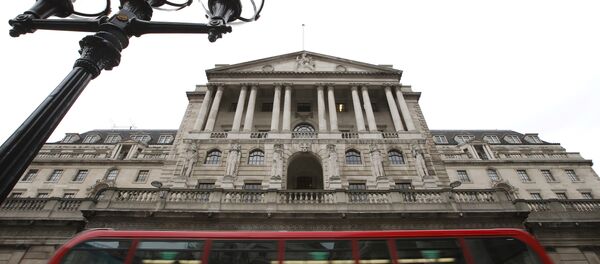Kristian Rouz — The liquidity of UK government bonds (gilts), is diminishing amidst tighter regulations, making it harder for Britain to borrow funds and slowing the pace of debt imbursement, as outlined in a report by the nation's bonds agency. Despite providing sound opportunities to remodel the debt-fueled growth model into a more substantial one, based in the real economy, the gilt glut is marring the Bank of England's (BoE) outlook on monetary tightening. The BoE is aimed at staving off bubbles in the financial sector, resulting in additional (and unnecessary) risks to GDP growth in the short-to-medium term.
The London-based UK Debt Management Office (DMO) reported on Wednesday that the gilt traders have found themselves in deteriorating conditions doing their business as tighter governmental regulations on the nation's bonds have substantially increased the costs of gilt-related transactions. The new rules implemented by the cabinet have also made commercial banks more reluctant to put their capital into the UK's government debt.
"Banks are reassessing their business models accordingly," the DMO reported to HM Treasury.
UK debt investors also outlined that the abundance of new regulations had contributed to the lower liquidity of the gilts, while the repurchase (repo) costs have risen.
"There is no question that liquidity is lower in gilts," Richard Kelly of the London-based Toronto-Dominion Bank said. "The same can be said about other fixed-income products for that matter."
The UK has recently been struggling, selling its debt to attract funds. On 20 January, the gilt auction attracted its lowest amount of funds in almost seven years, and the first gilt dealer went out of business since 2009, meaning the outlook on UK bonds is rather pessimistic.
As debt capital costs rise, commercial banks are seeking other, more profitable opportunities for investment. While the gilt yield is low, indicating the relative safety of the entire UK financial market, higher costs and lower returns on investment amidst a calm outlook on the broader economy are diverting capital from UK debt.
"The economics of the market-making model has come under pressure from many sides," Christoph Rieger of Frankfurt-based Commerzbank AG said. "Regulations are a key aspect."
During the DMO meeting with HM Treasury representatives, British bond investors expressed their interest in longer-term gilts, which would also pay inflation-linked returns. Given that UK inflation is currently at zero, that might indicate the market's general sentiment price index will accelerate eventually.
Representatives of pension funds expressed similar interest during the meeting, emphasizing the importance of core price index (CPI)-linked returns on longer-term gilts.
All that said, UK inflation is generally expected to lift off from zero, allowing the BoE to sway from low base interest rates, currently at 0.5%. Moreover, the Conservative cabinet is gradually decreasing budget expenditures, and is adjusting its fiscal policies to the market's reality. While both fiscal and monetary policies are bound to return to normalcy and proper discipline, the boost in domestic consumption is likely to drive further economic expansion, meaning the labor market will be cabinet's main concern over next several years.





